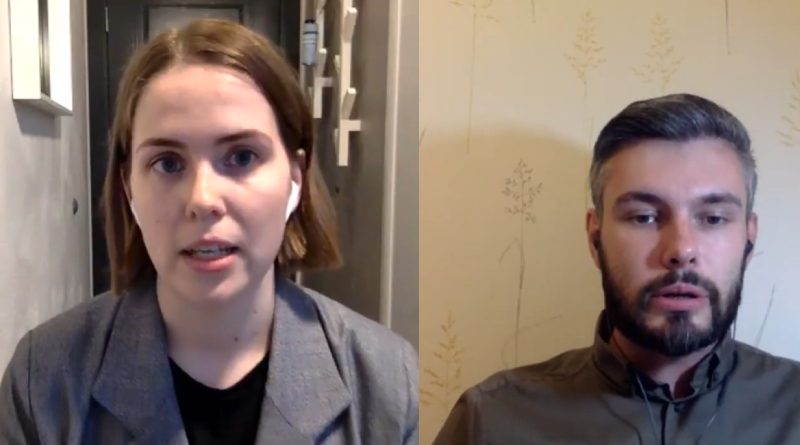Experts Katsiaryna Shmatsina and Arseniy Sivitsky on the Protests in Belarus
By Karl Afrikian, MALD 2022 Candidate, The Fletcher School
On September 22, 2020, the Fletcher Russia and Eurasia Program welcomed two Belarusian geopolitics experts to speak via Zoom to the Fletcher community about the ongoing protests in Belarus. Belarus has been in a state of civil unrest following the election on August 9, with incumbent President Aleksander Lukashenko declaring victory with 80 percent of the vote despite both domestic and foreign backlash regarding the election’s validity. During the event, scholars Katsiaryna Shmatsina and Arseniy Sivitsky discussed Belarus’ future in the context of what may be the end of Lukashenko’s tight rule over the country since 1994.
In her opening statement, Shmatsina, an analyst for the Belarusian Institute for Strategic Studies, focused primarily on Belarus’ domestic conditions prior to the 2020 presidential election and its impact on the ongoing protests. She noted that Lukashenko’s long reign, alongside a lack of any indication of surrendering power, has compounded the existing negative sentiment of the Belarusian public toward the authorities. She discussed how Lukashenko has worked to remove political rivals to secure his presidency as he has tried to cling to power. Belarus’ poor economic and healthcare response to COVID-19 was also cited as a major source of frustration for Belarusians.
Shmatsina compared the recent election to the 2015 election, when Lukashenko and his allies orchestrated another rigged race. She claimed that Belarus consequently expanded relations with the West to downplay concerns over authoritarianism. Belarusian opposition activists saw otherwise, as the formation of civil society remained hindered and political opponents of Lukashenko, such as banker and philanthropist Viktar Babaryka, were jailed. Shmatsina argued that the protests in Belarus are now “past the point of no return” as the populace is “beyond fear” about challenging Lukashenko’s rule.
Sivitsky, the Co-Founder and Director of the Center for Strategic and Foreign Policy Studies in Minsk, provided a unique take on the ongoing protests in Belarus. He postulated that, notwithstanding appearances to the contrary, the Kremlin is pulling the strings in Belarus by working with opposition leaders rather than supporting Lukashenko. This argument contradicts not only Belarus’ and Russia’s accusations that the West is supporting the protestors to generate another “color revolution” but also Putin’s promised financial and military assistance to maintain Lukashenko’s regime. In his initial remarks, Sivitsky stated that the Russian authorities view this situation as a “deep political crisis which actually requires an inclusive, all-nation dialogue” between Russia, Belarus’ government, and Belarusian civil society. He claimed that this chaos, alongside the ambiguous legal relationship between Russia and Belarus, represents a means for Russia to further interfere in Belarusian domestic affairs.
In recent years, Lukashenko has worked to distance Belarus from Russia, rejecting attempts by Putin to strengthen the Union State between the two countries. According to Sivitsky, Lukashenko has stood in the way of Russia’s foreign policy and is now no longer useful to Putin, who views the current protests as a potential way for the Kremlin to institute regime change in Belarus to better promote Russian interests. Sivitsky compared this phenomenon to the Armenian “Velvet Revolution” of 2018, during which former President Serzh Sargsyan attempted to retain power through constitutional reform. Russia appeared to act neutrally during the protests after a similarly unfair Armenian vote, allowing for Sargsyan’s removal and the election of Nikol Pashinyan as Prime Minister. Sivitsky warns that Putin may use the “Moldovan model” on Lukashenko, referring to when the Kremlin along with the West pushed out oligarch Vladimir Plahotniuc from Moldovan politics.
Sivitsky expects Russia to help install a pro-Kremlin president in Belarus following Lukashenko’s eventual departure. He suggested that Svetlana Tikhanovskaya, who is currently exiled in Lithuania, could fulfill this role. Tikhanovskaya claims, however, that her role is to serve in a transitional government until a proper election is held, having only run for president after her husband, the original candidate, video blogger Sergei Tikhanovsky, was arrested.
During the discussion, Sivitsky and Shmatsina continued to debate the future of Belarus as it faces political, social, and economic instability. They discussed the crucial role of technology, particularly the instant messaging app Telegram, in maintaining the momentum of the Belarusian protests, as it provides encrypted communication for people to organize in spite of limitations on free speech and assembly.
The will of the Belarusian people for legitimate representational government cannot be ignored when discussing these developments, as many are quick to focus exclusively on geopolitics. Decades of authoritarian rule under Lukashenko has led to Belarus’ largest protests in history, and Belarusians’ genuine anger and desire for change are crucial in understanding the current upheaval. The event showed that the future of Belarus remains uncertain, with the West, Putin, Lukashenko, and Belarusian dissidents jockeying for influence in what many refer to as the “last dictatorship of Europe.” However, it seems that this nickname for Belarus may soon become obsolete.
We are live with experts Katsiaryna Shmatsina and Arsen Sivitski to discuss the ongoing protests in Belarus and their potential geopolitical implications.
Posted by Fletcher Russia and Eurasia Program on Tuesday, September 22, 2020

